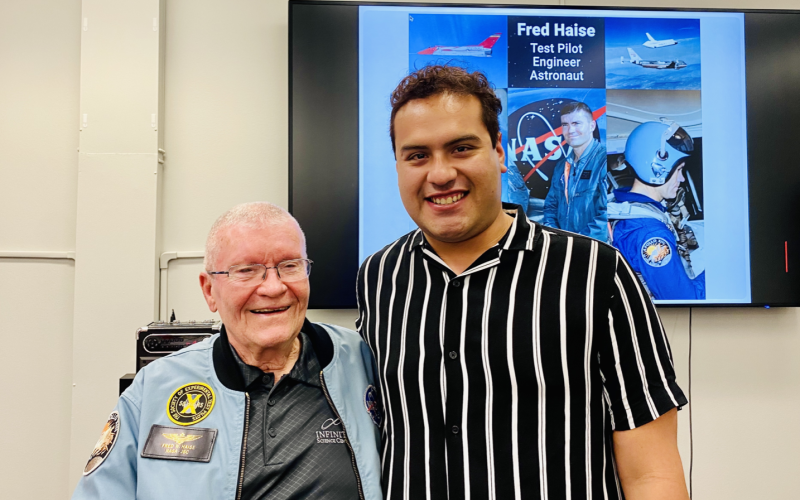UAlbany Student Gets Immersive Space Science Experience at NASA’s LiftOff Summer Institute

By Bethany Bump
ALBANY, N.Y. (Sept. 3, 2024) — Alejandro Mundo, a high school science educator and doctoral student in UAlbany’s School of Education, was selected to participate in NASA’s LiftOff Summer Institute, a weeklong professional development training for teachers interested in space science.
The training took place at the end of June at NASA’s Johnson Space Center in Houston, Texas, and included opportunities for participants to meet with NASA scientists, engineers and astronauts; conduct laboratory experiments with space plants; network with fellow educators; observe astronaut training; tour mockups of the International Space Station; and visit leading space and science museums.
Mundo, who is pursuing a PhD in curriculum and instruction with a focus on science and mathematics education in the Department of Educational Theory and Practice, has taught Earth and space science in the Bronx for several years. His participation in the LiftOff program was made possible through the New York State Space Grant Consortium, which awarded him a grant to attend.
“Being part of the LiftOff Summer Institute has been a fascinating and unique experience for me, filled with many surprises out of this world,” he said. “One of the highlights was meeting astronaut Fred Haise, a member of NASA’s Apollo 13 mission, and hearing about his space experiences. I also discovered new ways to incorporate space planting and missions into my science classroom. Engaging with space scientists and engineers to connect their research to education was incredibly valuable. Visiting the astronaut training facilities and the International Space Station laboratory was a thrilling experience and I can’t wait to share it with my students.”
The LiftOff Institute emphasizes science, technology, engineering and mathematics (STEM) experiences by incorporating a space science theme supported by NASA missions.
This year, the training focused on the topic of plants in space. Participants explored how plants can adapt to extreme environments on Earth and in microgravity. Research has shown that certain plant species can grow and develop through a full life cycle in space and understanding how to support plant life in space will be essential for long-term human space exploration, Mundo said.
“Today’s students are the future explorers who will journey to the moon and beyond,” he said. “We are preparing them for the scientific discoveries and technological advancements that will enable them to live and work on another world. Our students will not just go to space; they will live there. It is crucial to prepare them for this future, and I am committed to empowering my students to be ready.”
LiftOff participants also had an opportunity to hear from fellow educators about methods for teaching space science in the classroom. Mundo delivered a presentation on a teacher resource he previously developed through the Climate Change Research Initiative at the NASA Goddard Institute for Space Studies, focusing on climate change, remote sensing and education.
"Highly qualified teachers, like Alejandro, benefit significantly from attending quality professional development programs that are outside their district like the LiftOff Summer Institute for educators," said Celena Miller, project manager for the University of Texas at Austin's Center for Space Research, which oversees the program. "These experiences enhance their instructional practices and keep them at the forefront of the latest educational advancements and NASA missions. The LiftOff Institute focuses on integrating STEM concepts with hands-on, inquiry-based learning strategies, which can invigorate teaching methods and improve student engagement. By participating in such workshops, educators gain valuable tools and techniques that help them foster a more effective and inspiring learning environment. Additionally, these programs offer opportunities for collaboration, professional growth and future opportunities that ultimately leading to better educational outcomes for their students."
Mundo said he is passionate about raising minority youth as future scientists and encouraging them to pursue STEM careers. As part of his teaching, he emphasizes an informal and hands-on approach to learning, such as through trips to the American Museum of Natural History. He also hosts a science club that provides students with hands-on science activities, environmental stewardship and community service opportunities.




